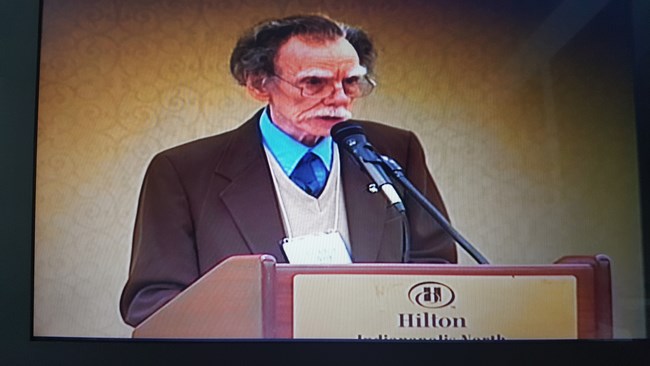Last updated: November 11, 2020
Article
The Passing of a Pioneer: Underground Railroad Scholar Larry Gara

In November 2019, Dr. Larry Garry, historian, teacher, and writer passed away at the age of 97. A Quaker, Dr. Gara, was born in San Antonio, Texas, and raised in Reading, PA. He held degrees from Penn College (BA), Pennsylvania State University (MA), and the University of Wisconsin (PhD). In 2008, he also received an honorary degree from Wilmington College in Ohio where he taught for over 40 years and was an emeritus professor of history. In college, Gara’s early interest in American reform movements led him to the study of the Underground Railroad. Later, while a graduate student at the University of Wisconsin, he chose to continue this research and decided there was more to it than he had previously uncovered. Searching for more information, he read narratives by individuals who were formerly enslaved. He also read Underground Railroad operative William Still’s book. His eyes were opened! In 1961 (reprinted in 1996), Gara published the groundbreaking now classic book, The Liberty Line: The Legend of the Underground Railroad. The book’s purpose was to describe the Underground Railroad legend, contrast it with the known facts, and reveal the vital role freedom seekers played in their own liberation. In 2009, Dr. Gara was honored at the National Underground Railroad Conference in Indianapolis, IN for his seminal work in Underground Railroad history and research.The husband, father, and grandfather, was not content to leave the struggle for social justice in the past. He had a lifetime commitment to peace activism, participating in protests and demonstrations into his 90s. He will be missed!
Remembering Gara:
"He set the bar pretty high for all of us interested in the history of one of the most radical, and meaningful movement for social and political justice in the United States."
-Richard Blackett, Vanderbilt University
"I first became aware of Larry Gara's work as a grad student in the 1970s. I had the good fortune to meet him at a conference. Since then, as I've become more and more a student of the Underground Railroad, I've been ever cognizant of his importance, both his warning to be aware of mythological elements in our approach to the network that helped the freedom seekers, and of the overlooked role of African Americans themselves.One of my prized possessions is a signed copy of his Liberty Line."
-Roy E. Finkenbine, University of Detroit Mercy
"Larry Gara's The Liberty Line was one of the first works I turned to to learn more about the Underground Railroad. As I pondered the role of my own white ancestors in their southwestern Michigan network, Gara's critique of romanticized white recollections provided an important reality check. Decades-old memories deserve respect, and a healthy skepticism. Similarly, his insistence on African American agency in their own self-liberation stories was and continues to be a necessary correction. Gara inspired much of the recent scholarship that rightfully places African-Americans at the center of Underground Railroad history. But what struck me most upon reading his work was the 1996 preface, written thirty-five years after The Liberty Line's initial publication. He offered a correction to his earlier sweeping denial of white abolitionist contributions. 'Were I to write the book again,' he wrote, 'I would give more recognition to the [white] abolitionists, many of whom risked a great deal to help escaping slaves.' This is a revision to a central tenet of his own work, a candid re-orientation. Consequently, not only did Gara make and inspire substantive contributions to the field, he modeled professional integrity in the pursuit of historical accuracy. His is a meaningful and honorable legacy."
-Debian Marty, California State University Monterey Bay
"I never met Larry Gara, but his work and his life inspired and amazed me even when I sometimes disagreed with his views. Here was a guy who went to prison for resisting the draft during World War II and then protested segregation once he got inside. Here was a scholar who wrote a groundbreaking book in 1962 that I was still using, arguing with, and sometimes teaching well into the 2010s. Without doubt, he was the single most influential scholar of the Underground Railroad in the 20th century. But finally and most important, here was a husband and a father who was married for more than seventy years in our turbulent times. What a remarkable life and career! I have nothing but the deepest respect for his memory."
-Matthew Pinsker, Dickinson College
"Larry Gara's ground breaking work provided a much-needed conversation on how we approached our local Underground Railroad research stories. He encouraged us to look for the often nameless and faceless freedom seekers that were at the center of this important history."
-Dona Stokes-Lucas, Indiana Freedom Trails
